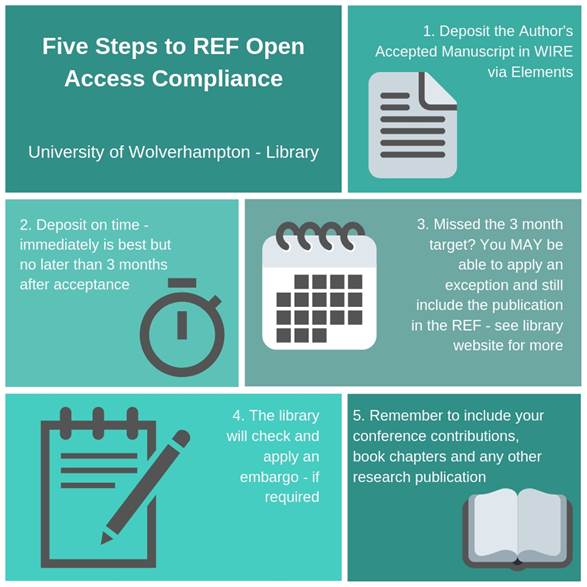REF 2029 Open Access Policy
Research England and the three other UK HE funding bodies believe that the outputs of research should be as widely accessible as possible. For this reason, an open access policy was introduced for REF 2021. The REF 2021 policy still applies for part of the REF 2029 census period, but from 1 Jan 2026 a new policy comes into effect.
REF Open Access Policy Requirements
The REF open access policy applies to journal articles and conference contributions with an ISSN that are accepted for publication on or after 1 January 2021
The REF policy states that to be considered open access, the output must be discoverable, and free to read and download, for anyone with an internet connection
How to make your journal articles and conference contributions REF compliant
- Archiving the correct version: Please deposit a copy of your publication in WIRE via Elements, this usually needs to be in the form of an author’s accepted manuscript. An author’s accepted manuscript (AAM) is the final version of a publication, after peer review and edits, that is agreed to be published (therefore accepted) but is not the version that has been published. It should not normally contain the publisher’s typesetting, fonts, logo or page numbers and is often a Word document.
- Archiving on time: Publications should be deposited in WIRE via Elements immediately but no later than three months after the acceptance date for those articles and conference papers published between 1 January 2021 and 31 December 2025. From 1 January 2026, the deposit deadline will be no later than three months after the date of first publication. To allow repository staff sufficient time to process the deposit, it is best to do this as soon after acceptance as possible.
- Missing the three months target: If for any reason your publication can’t be deposited in WIRE via Elements within the three months after acceptance, it may be possible to apply an exception to the publication. This means the publication can still be included with the REF submission. It will not always be possible to apply an exception and where not, the publication will be non-compliant and therefore ineligible for submission to the REF. The REF Strategy Panel will review all exceptions requests. To view all of the possible exceptions in full and to request one to be applied to one of your publications, please go to: Request an Exception to the REF Open Access Policy
- Embargoes: Publications should still be deposited in WIRE via Elements within the three months after acceptance timeframe even if an embargo needs to be applied. The REF open access requirements allow authors to respect embargo periods set by publishers up to a maximum of 12 months for Main Panels A and B and a maximum of 24 months for Main Panels C and D for articles and conference papers published between 1 January 2021 and 31 December 2025. For articles and conference papers published after 1 Jan 2026, the maximum embargo periods are 6 months for Panels A & B, and 12 months for Panels C & D. A member of the Scholarly Communications Team will check if an embargo is required and the file will not be made available to the public until the appropriate time. An exception may be required if a publisher requires an embargo that exceeds the stated maxima but was this was the most appropriate place for the output to be published. To view all of the possible exceptions in full and to request one to be applied to one of your publications, please go to: Request an Exception to the REF Open Access Policy
- More than Journal Articles: Conference papers (with an ISSN) should also be deposited in the same way as journal articles, within three months of acceptance. All types of research output publications, including book chapters can be archived in WIRE via Elements, where publishing agreements allow, and all publications since 2021 would also ideally be included in WIRE. It is recommended that when negotiating a publishing agreement some kind of archiving permissions are included. This will help the university show that it has gone beyond the minimum open access requirements (REF environment template).

Open Access and WIRE
You can find out more about open access, the University repository WIRE and the benefits of making your research outputs openly available on the University Library webpages.
Open Access for other output types
The intent of the REF open access policy is to provide a set of minimum requirements for open access, while encouraging an environment where researchers and HEIs move beyond the minimum requirements. It has been announced that the REF after REF 2029 will include requirement for long form publications, such as monographs, edited books and book chapters.
To demonstrate where these requirements have been exceeded as part of the environment templates, and to comply with the University of Wolverhampton Open Access Publications Policy, outputs of all types should be deposited on WIRE wherever possible.
Request an Exception to the REF Open Access Policy
REF 2021 developed a number of valid exceptions to the open access policy to provide a degree of tolerance where mitigating circumstances have prevented compliance. You can request an exception to cover circumstances where deposit was not possible, or where open access to deposited material could not be achieved within the policy requirements.
Outputs with an exception applied will be considered to be compliant with the open access requirements.


/prod01/wlvacuk/media/departments/digital-content-and-communications/images-2024/Simmi-Sahota-degreeshow-thumbnail.png)
/prod01/wlvacuk/media/departments/digital-content-and-communications/images-2024/250630-SciFest-1-group-photo-resized-800x450.png)
/prod01/wlvacuk/media/departments/digital-content-and-communications/images-18-19/210818-Iza-and-Mattia-Resized.jpg)
/prod01/wlvacuk/media/departments/digital-content-and-communications/images-2024/241014-Cyber4ME-Project-Resized.jpg)
/prod01/wlvacuk/media/departments/digital-content-and-communications/images-18-19/210705-bric_LAND_ATTIC_v2_resized.jpg)